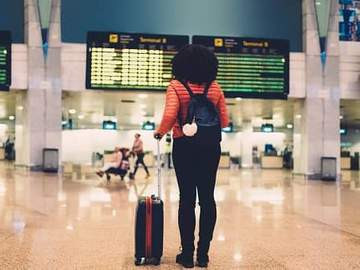When planning your adventures, you might pause not just over destinations and itineraries, but also something as fundamental as spelling. Take the word “traveled,” for instance. Is it spelled with one “l” or two? Both “traveled” and “travelled” are commonly seen, leading to potential confusion, especially when you’re focused on sharing your experiences online or ensuring your travel writing is polished.
Traveled or Travelled? Unpacking the Spelling Mystery
The variation in the spelling of “traveled” (and its related forms like “traveling” and “travelling”) boils down to a difference between American and British English. In the United States, the preferred spellings are “traveled” and “traveling,” using a single “l.” However, across the pond and in most other English-speaking countries, you’ll typically find “travelled” and “travelling,” with a double “l.”
 woman looking at departures board
woman looking at departures board
A traveler at an airport departures board, considering different spellings of ‘traveled’ depending on their destination.
This divergence isn’t random; it’s rooted in historical and linguistic factors, primarily influenced by the work of a key figure in American lexicography.
The Noah Webster Factor: American Spelling Reform
The reason for this spelling difference can largely be attributed to Noah Webster, the influential American lexicographer. Webster was a proponent of spelling reform, aiming to simplify and standardize American English. He believed that English spelling could be more logical and distinct from its British origins. As part of his reform efforts, Webster advocated for the single “l” spellings in words like “traveled” in his dictionaries, which became highly influential in shaping American English.
Webster’s reforms weren’t limited to “travel.” The same principle applies to other words where a single vowel is followed by “l.” Consider “canceled” and “cancelled”—American English favors the single “l” (“canceled”), while British English retains the double “l” (“cancelled”). This pattern is consistent across many similar words.
More Than Just ‘Traveled’: Other Words Affected
Understanding the “traveled” vs. “travelled” distinction helps in navigating other spelling variations between American and British English. Here are a few more examples where this single vs. double “l” difference applies:
- Traveling/Travelling: Similar to “traveled,” “traveling” is the American spelling, and “travelling” is the British spelling for the present participle form.
- Canceling/Cancelling: Following the same rule, American English uses “canceling,” and British English uses “cancelling.”
- Fueling/Fuelling: When adding “-ing” to “fuel,” Americans spell it “fueling,” while others spell it “fuelling.”
- Signaling/Signalling: Again, “signaling” is American, and “signalling” is British.
These examples highlight a consistent pattern driven by Webster’s spelling reforms in American English.
When to Double the ‘L’: The Accent Rule
It’s important to note that the single “l” simplification in American English isn’t universally applied. When the stress or accent falls on the syllable before the “-ed” or “-ing” ending, American English, like British English, typically keeps the double “l.”
Consider these examples:
- Controlled/Controlling: The stress is on the second syllable (“-trolled”), so both American and British English use double “l.”
- Expelled/Expelling: The stress is on the second syllable (“-pelled”), and both spellings use double “l.”
- Patrolled/Patrolling: Again, the stress on the second syllable (“-trolled”) dictates the double “l” in both American and British English.
This rule of thumb about stressed syllables helps to understand when to retain the double “l” even in American English.
Why This Matters for Travelers
For travelers, being aware of these spelling differences is more than just a matter of linguistic curiosity. If you’re writing a travel blog, contributing to online travel forums, or even just captioning your vacation photos on social media, understanding your audience is key.
- Targeting a US audience? “Traveled” and “traveling” will resonate best.
- Targeting a broader international audience or specifically British readers? “Travelled” and “travelling” might be more appropriate and familiar.
Consistency is also important. Choose the spelling convention that suits your audience and stick with it throughout your writing.
Conclusion: Spelling Clarity on Your Travels
The spelling of “traveled” and “travelled” is a fascinating example of how language evolves and varies across regions. While both spellings are correct within their respective dialects, knowing the distinction between American and British English conventions ensures your travel writing is clear, effective, and tailored to your intended readers. So, whether you’ve “traveled” or “travelled” the world, clarity in communication is always a valuable asset on your journeys.
